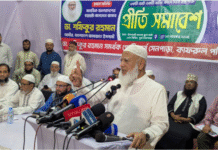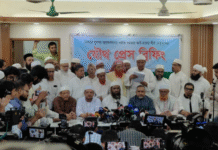M. Shahidul Islam
Since its inception, the Awami League (AL) has had a predilection for playing religious cards for political dividends. While Moulana Bashani and his National Awami Party (NAP) boycotted the 1970 election in protest against the Legal Framework Order (President’s Order No. 2 of 1970) that had enshrined in Article 20 that “Pakistan shall be a Federal Republic known as the Islamic Republic of Pakistan,” Sheikh Mujib cared little about such distinctive religiosity of politics and joined the electoral race.
The move was deemed a prudent one as it led to the creation of Bangladesh. But what seemed politically expedient in 1970 may prove disastrous in 2014. The AL-led regime’s flippant stance on the Latif Siddiqi saga entails a danger that may change the nation’s political landscape in the short and long run.
Dangerous deal
Latif Siddiqui had ventured into the country after reaching a dangerous deal, the full context of which remains shrouded in mystery and can only be decoded from what political dividend the ruling party, and the country from where Siddiqui was allowed to fly in, gain from this rekindled phase of a sensitive thunderstorm involving Bangladesh’s socio-political and religious cohesiveness .
We have learnt that the former AL minister’s sudden arrival to Bangladesh follows the crafting of a hastily devised tripartite deal between the AL-led government, Siddiqi, and India. The sordid deal’s bona fide is proven by following facts:
First: Siddiqui was received at the airport by some intelligence officials from Bangladesh and India; taken to the VIP room; custom and immigration processes cleared off; and was whisked away to an unknown destination, according to multiple sources of airport employees and accompanying passengers.
Secondly: He was not arrested upon arrival to the country due to what the state minister for home affairs said, ”His status being an MP who could not be arrested without the permission of the Parliament Speaker.” The Speaker, however, instantly rebutted this pretext by saying, “An MP cannot be arrested from the Parliament premise without Speaker’s permission, but there is no bar on arresting an MP outside the Parliament premise if there’s a warrant awaiting execution.”
Thirdly: Siddiqui ventured in September to go to Canada from the USA where he had made the slurring and the derogatory remarks about the Islam, the Haj and Prophet Mohammed (sm). The Canadian authorities refused to issue him a visa due to the ‘high probability’ of him seeking protection in Canada and Canadian immigration laws barring entry of an asylum seeker from a third country (USA) unless protection has been sought to that country first, and, all available remedies or reliefs have been exhausted.
The Indian ploy
Then conveniently, an Indian ploy kicked in. Despite being aware of Siddiqui’s such existential and politically explosive predicaments, India gave him a visa and sheltered him officially where he stayed as a visitor-guest until last Sunday.
Fourthly: The time chosen to allow Siddiqui back to the country is a very curious one. Mindful that his entry to the country would unleash a flood of protests and antagonism, the news of his arrival was deliberately let known to the mass media to arouse that expected hysteria in order to showcase to the world that Bangladesh is infested with the virus of Islamic militancy which only the AL-led regime can be trusted to reign in.
Fifthly: Siddiqui had to be brought to the country due to the hoax of the so called Bordawan blast having been exposed by the West Bengal Chief Minister Momta Benarjee who had publicly stated last week (reported by Daily Ananda Bazar Potrika) that the Bordawon bomb blast was a ‘handiwork of RAW’, referring to the infamous Research and Analysis Wing outfit that overseas India’s external intelligence.
It’s abundantly clear now that the ongoing tussle between India’s central government and the provincial government of West Bengal has had much to do with Siddiqui’s sudden influx into Bangladesh. As well, the disgrace heaped upon the concerned Bangladeshi intelligence outfit following discovery that the recent murder of the Rajshahi university professor, Shafiul Islam, was not an act committed by the political Islamists, as the sleuths had decried vehemently, needed to be buried under the anticipated mass hysteria created by Siddiqui’s return to Bangladesh.
Finally: There is a bigger design to use Siddiqui as a political fodder to deflect the impact of a brewing mass movement to overthrow the government in order to ensure the holding of a fair and participatory general election which the AL-led regime has denied to the people of Bangladesh in January 2014 and, in favour of which momentum is building by the day.
New blasphemy law
With the Siddiqui factor added to the mix, the nation now sits on a vortex of impending eruption. What follows will be a mix of bluster and bonhomie by the government and discordant street agitations by the political Islamists with no clear vision to achieve any tangible political goal. Call it another phase of anarchy set only to despoil peace and progress. Meanwhile, Siddiqui will remain a political football to be kicked around by many quarters, external and internal, for months and years to come.
Even his arrest and prosecution will mean nothing substantive; the existing laws in Bangladesh allowing only a token conviction for such crimes of religious bigotry, with only two months of imprisonment. Hence the political Islamists and many other peace loving people will keep clamouring for the enactment of a Blasphemy Act in order to prosecute people hurting sentiments of the faithful of any religion with harsher punishments.
The moot question is: Can the AL-led regime dare to enact a visionary Blasphemy Act at the cost of sacrificing its secular credential? It perhaps can, if that saves its power and, if there is enough time left to overcome the hysteria and the anger that has already been roiling the nation.
If not, Siddiqui will prove to be a catalyst for the government’s downfall on one hand, and an Achilles Heel that the AL leadership and its external allies hardly envisioned before deciding to using him as a cannon fodder, on the other. No wonder Mark Twain aptly cautioned: “I am quite sure now that often, very often, in matters concerning religion and politics, a man’s reasoning powers are not above the monkey’s.”
Source: Weekly Holiday










What a bunch of hooey!!
We all know or at least can speculate that Latif Siddiqui’s suddent appearance in Dhaka is not as straight forward as it has been made to look. But to suggest that the Siddiqui saga has been timed to hide series of looming AL/India ‘conspiracies’ and that his recent anti-Isalam rants would ulmitately be the cause of fall the government overly speculative!